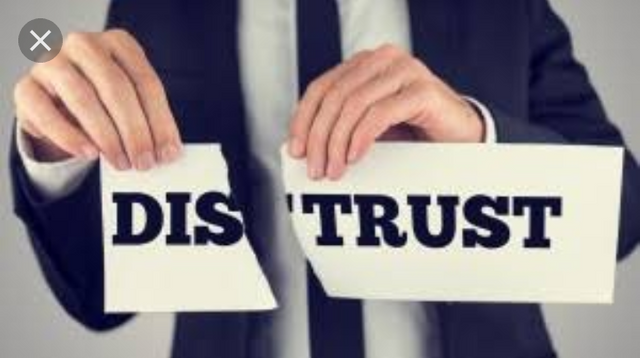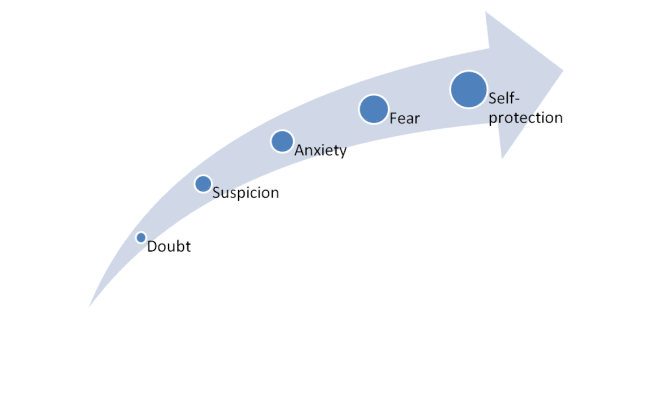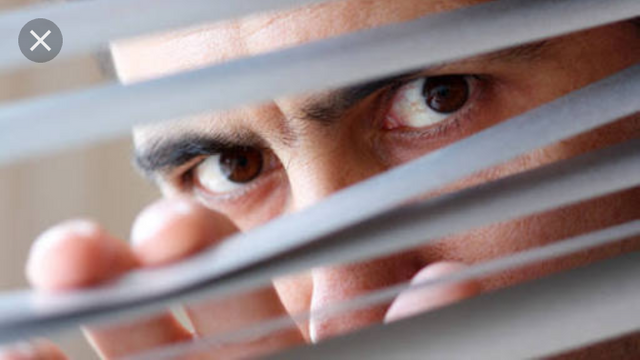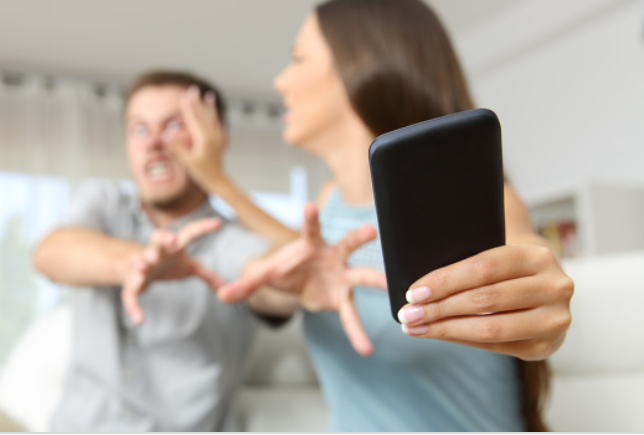Relationship : Distrust in A Relationship
Jealousy and Distrust. Most people have experienced a feeling of jealously and distrust at some stage during their relationship. This can range from feelings of uneasiness and being uncomfortable right through to anger leading to arguments and resentment.
A common cause of jealously within relationships can occur when one or both partners are feeling insecure. Personal insecurities can be caused by low self-esteem and cause negative thinking patterns. If a person thinks poorly of themselves, they may start to question why their partner is with them and query their partner’s actions and behaviours.

What is Distrust? Definition
Distrust is said to be lack of Trust or Confidence.
When you Distrust a person it means you can't confined in the person or you have lost faith or confidence in such one.
Most cases what causes distrust in a Relationship is Jealousy. When we feel insecured in our Relationship.
Does Facebook bring out the green-eyed monster of jealousy?’ has found a direct correlation between the amount of time spent investigating your partner on Facebook and an increase in feelings of jealousy leading to a negative influence on behaviour and relationships.
Common causes of feelings of distrust
Within a relationship, distrust is an expectation that a partner’s actions, intentions and motives will be are harmful to one’s own interests.
There are many causes that can lead to feelings of distrust within a relationship and will greatly vary depending on the couple. Some common causes of feelings of distrust are –
when one individual breaks promises to their partner
a partner being untruthful about what their actions have been or who they have been in contact with
a partner not behaving within the boundaries of the relationship
a relationship not having established clear boundaries
How couples can work to resolve feelings of jealousy
To better understand how jealousy is affecting your relationship and resolve these feelings, take some time to speak to your partner openly. Let them know that you love them and how you are feeling. Chances are your partner will offer reassurance and this discussion may provide you both with the opportunity to reaffirm your feelings towards each other and identify why you are together.
Take some time to focus on the reasons why your relationship is stable and satisfying for each of you. Respect yourself and recognise that you are someone that is worth loving and that your partner chose you for a very good reason!
This is Kinda one of the main reason I'll kick against Facebook but let's not go deep into that.
After doing the listed above, you have to be very careful the way you talk or chat with opposite sex and time.
If an opposite sex calls you around 12am what does it speculates, it probably means you are Cheating on your spouse and it would endanger the relationship and also lead to Distrust.
How to Trust:
You can make an informed decision and go for it. When you decide to trust someone it means that you believe in that person's integrity. Trusting is knowing that ultimately this person's intentions are good. And it also means that you know that they are going to make mistakes.
Signs and symptoms of Distrust:
Everyone has uncertainty about whom to trust, how much to trust, when not to trust, and so forth at one time or another. In fact, every day we make choices about whom and how much to trust, and sometimes we are more willing to trust than at other times. That’s a good thing; a total lack of mistrust would indicate a serious psychological problem. Judgments about when and whom to trust help keep us safe and alive!
Signs that a person may be excessively mistrustful include:
A total lack of intimacy or friendships due to mistrust
Mistrust that interferes with one's primary relationship
Several intensely dramatic and stormy relationships in a row or at once
Racing thoughts of suspicion or anxiety about friends and family
Terror during physical intimacy
Belief that others are deceptive and malevolent, without real evidence
When mistrust seems to play a dominant role in a person's life, past disappointments or betrayals may be at the root of the issue. Mistrust is a valid and reasoned response to feeling betrayed or abandoned, but a person's life can be adversely affected when feelings of mistrust are pervasive, resulting in anxiety, anger, or self-doubt. Fortunately, a person can learn to trust again, and working or reading my post can speeden your process to trusting.

Solving Distrust issues:
Therapy can help individuals address and identify the source of problematic trust issues. Being unable to trust can destroy friendships, careers, and marriages, but fortunately, learning to trust again is not impossible. For example, a person who experienced infidelity in one relationship may transfer that fear onto every future relationship, causing unnecessary pain and turmoil for both partners. By working with a therapist, the same person can separate past trust issues from future fears, and teach them how to rebuild trust in existing relationships. Trust is a quality that develops over time in every context, and with proper guidance, a person can gain the insight to identify where trust was compromised in the past. In fact, the therapy process itself helps many people learn to trust again, as trust and mutual respect are integral to the relationship between therapist and client.
Emotion and Distrust:
In my previous edition or post I talked about Emotion, if you haven't read it I'll advice you to do so for it helps alot.
Strong Emotions. Strong emotions are both a cause of, and a result of, conflict. People in conflict may have a variety of strong, and often negative emotions--anger, distrust, disappointment, frustration, confusion, worry, or fear. Distrust is a strong emotion which must be dealt with by care and love.
Distrust is the confident expectation that another individual's motives, intentions, and behaviors are sinister and harmful to one's own interests. In interdependent relationships, this often entails a sense of fear and anticipation of discomfort or danger. Distrust naturally prompts us to take steps that reduce our vulnerability in an attempt to protect our interests. Accordingly, our distrust of others is likely to evoke a competitive (as opposed to cooperative) orientation that stimulates and exacerbates conflict. Distrust has also been linked to lower job satisfaction, commitment, and motivation.
Due to its destructive potential, we proceed to review the origins and development of distrust to lend insight into the phenomenon of distrust and how it can be managed more effectively.
When distrust comes into a relationship, it is very difficult to restore what we feel for the other person again. It is easy for suspicion to turn into obsession. The effects of distrust can be disastrous. If it happens between friends it is relatively easy to keep our distance. But if it happens with our partner it is another matter altogether. If we start to doubt them, then the other person is going to feel accused. We may be afraid of offending them, and so how should we really react?
The formula of trust has many variables that we have not yet measured with precision. Sometimes we place all our confidence in a person we have just met. But, by contrast, our co-worker who we have been working with for six years may not give us that degree of certainty. Distrust seems at first sight the simplest way to guide us, at least the one that protects us most.
If we chose several people at random and asked them what trust and distrust are, then we would most likely find we agreed on more about the second one than the first. If we followed our instinct for survival then we would simply distrust the unknown. Trust is complicated. There are many factors to take into account: the emotions, the intensity, the situation and the people around us.
Voluntarily choosing to trust someone requires effort. It is a conscious decision. It is a personal commitment that we make, and we let go of our desire to control. We leave our emotions and our behavior in the hands of another person’s future behavior. That’s why when the trust is broken it is very difficult to recover, due to so many factors being involved and, therefore, a high chance of failure.
“Hate and distrust are the children of blindness"
If we take into account all the problems we can have in our relationships with others, then perhaps the most difficult one of all is lack of trust in a couple. If a friend or family member lets us down, it will hurt and we will start to keep our distance. We will start by avoiding any sort of close contact until we finally distance ourselves completely and emotionally from that person. Once the spiral of thoughts or feelings of lack of confidence begin, it is difficult to stop.

The effects of distrust
People always do things for a reason. Sometimes our way of thinking is conditioned by what are known as cognitive distortions. These include the prediction of thought, prediction of the future and generalization.
This means that, in the moment we feel that they have failed us, we presuppose a cause (usually a bad one) for that failure. And, on top of that, we will subconsciously make a prediction that they will fail us again. If they already did it once, surely they will do it again.
The degree of the “betrayal” we have experienced will decide what measures we take. But the wheel of distrust has started. We start to avoid that person, we move away, we keep our distance. We start a dynamic that will mean the end of that relationship, unless we try to consciously stop it, and that is not at all easy.
Distrust in the couple
We can take that path in our relationships with family or friends, but we can’t as a couple. In a couple there is an emotional coexistence where feelings do not follow patterns or rules. At the same time there are opposing forces that push us in opposite directions: from love to distrust and back again.
Once we begin to distrust, the secret battles begin. Hidden actions and hidden suspicions. When talking about distrust in the couple the most obvious reason seems to be infidelity. Nothing, however, is further from reality. Mistrust can occur in many of our day to day activities. We can trust our partner in many different areas: our family, their work, our friends, their friends etc. And they can let us down.
“What loneliness is more lonely than distrust?”
Suspicion tends to turn into obsession. The common space they both share is suddenly becomes a minefield for the other person. He or she will not know what is going to detonate the relationship. In the end the spiral turns into a battle of reproaches and blaming which can accelerate out of control.
Communication is the key word. Mistrust is a virus that is secretly at work in the relationship between the two people. It can stay dormant and silent and then at the most unexpected moment it suddenly explodes. Rebuilding these relationships is very complex. The antidote, once injected, is difficult to integrate into our feelings and emotions. There are many elements: responsibility overload, a search for perfectionism and guilt and doubts about how to remedy the situation on one side and on the other. It is not impossible, but it is an arduous path.
Everything seems to indicate that a vaccine is better than an antidote. What we mean by this is that the couple should work on what they have in common, but at the same time not overlooking the little things that affect us in the background. Couples who have the space and possibility to complain are the most likely ones to have a healthy relationship.
Surprisingly, understanding and commitment are not the foundations of a relationship. It is true that they are essential, but if we don’t communicate in situations of mistrust, then they will not be enough for our relationship to progress. The most important thing is to look after the spaces we share for dialogue about the small day to day problems and for the influence they may have on us.
You have experienced repeated breaches of trust and have grown to distrust another person to the point you are afraid for your emotional well-being.. .. .. Trust is the cord that holds two people together in relationship, and when it's severed, disconnection occurs.

My main advice is to avoid been misguided by inexperienced therapist or writings because that might change your mindset towards the negative or opposite direction. That's why my post is here to enlighten us about #"RELATIONSHIP"#.....
Thanks to Steemit Community, Steemians , Readers and myself. Big kudos to Steemit for this opportunity.
#Distrust Relationship #steemusa #wafrica #steemsoccor #nigerpigin
Beep bop, this is @pushbot.
I just received a signal from the Mother Ship that you may require a push.
You just got a 11.19% upvote courtesy of @mykewhizzy!
Message from the Mother Ship:
You can earn daily profit by delegating SP to make @pushbot stronger. Delegators receive a share in 95% of the earnings.
10 SP • 20 SP • 50 SP
100 SP • 200 SP • 500 SP
1000 SP • 2000 SP • 5000 SP
Any Other Amount